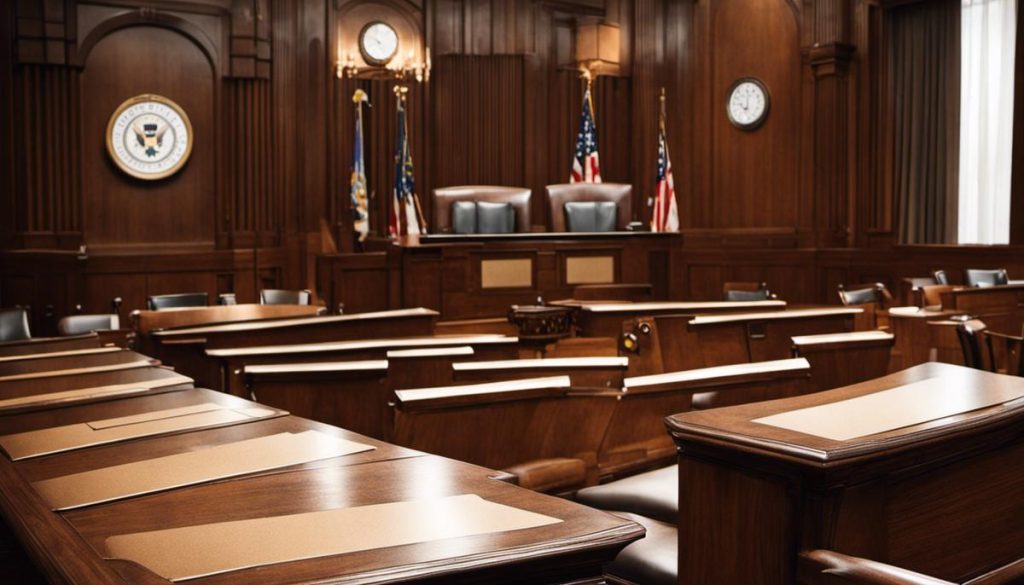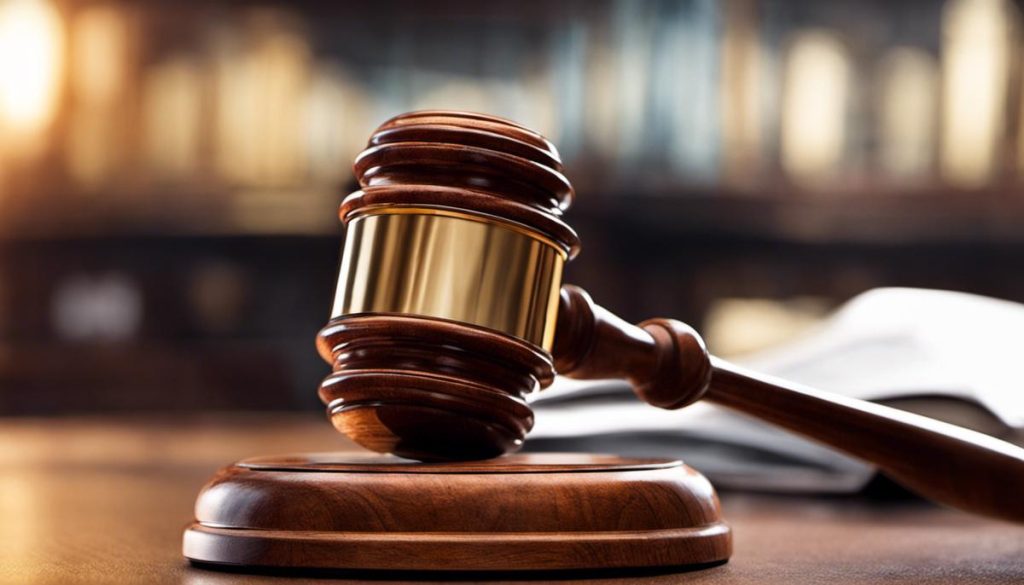Explore the balance between jury duty and business operations for entrepreneurs. Dive into the jury process, its impact on businesses, and strategies for continuity. Embrace civic responsibility while ensuring commercial success.
In a democratic society, jury duty is both a privilege and an obligation, serving as an integral part of our justice system. Yet for entrepreneurs and the wider business community, the call for jury service often comes with logistical complications and operational challenges. This comprehensive discussion aims to strip back the questions and concerns surrounding the topic, illuminating your responsibilities, your rights, and how to navigate the business impacts of jury duty. From understanding the court process in its entirety, to creating smart, emergency business continuity plans, this content is designed to arm you with the necessary knowledge, strategies and insights to balance your civic duty and commercial activities.
Table of Contents
Understanding Jury Duty Process
Exploring the Nuts and Bolts of Jury Duty: A Crucial Civic Responsibility
The jury duty process is a cornerstone of our democratic judicial system. Its value cannot be overstated as it lies at the heart of our constitutional right to a fair trial. So let’s delve into this process and fully get to grips with what it involves.
As a beginning point, the jury selection process fertilizes. Court administrators operate in conjunction with the local jurisdiction to delve into a pool of potential jurors, which is created from a list of registered voters, vehicle registrations, and often, utility company records.
A generous number of eligible citizens, commonly ranging from hundreds to several thousands, are notified of potential jury duty via postal mail. This document, referred to as a “jury summons,” tells when and where to report for jury duty. The summons often includes a questionnaire that is intended to root out any potential biases or conflicts of interest that may cloud a prospective juror’s judgement.
The potential juror’s journey doesn’t stop there. After being summoned, there is a process named ‘voir dire,’ a French term for “to speak the truth.” During this stage, a group of prospective jurors is escorted to a courtroom where both prosecutor and defense attorneys participate in screening jurors. The goal here is to garner impartial jurors who can fairly deliberate the facts and the law.
Understandably, not everyone can serve as a juror. Life circumstances, biases, or state laws can limit participation. Yet, unwarranted failures to appear can lead to the imposing of fines or in severe cases – imprisonment, underlying the real and present responsibility that comes with being summoned for jury duty.
Moreover, jury service isn’t just one-and-done for many citizens. Depending on the case’s complexity and the jurisdiction, jury duty can last from one day to several weeks or in rare situations, even several months. This varies greatly from jurisdiction to jurisdiction, with some having one-day or one-trial systems and others calling jurors to serve for a specified period.
Once a jury is selected, its duty is clear: to impartially review the evidence, apply the law as instructed by the judge, and deliver a verdict. This assignment, though potentially time-consuming and intellectually taxing, is pivotal to justice’s delivery and, by extension, our collective societal health.
In conclusion, the jury duty process is far more than a summons in the mail and an afternoon in a courtroom. It’s a complex, multifaceted machinery intricately calibrated to protect individual rights, ensure justice, and ultimately uphold the very principles upon which the United States was founded. It necessitates astute engagement, unwavering commitment, and perhaps above all – integrity. As cited, honed, and upheld by business and government alike, integrity remains key to this process’s success. Herein lays a vital reminder of the weight that this responsibility carries, ensuring this democratic process’ continued efficacy for generations to come.

The Impact of Jury Duty on Business Operations
The Impact of Jury Duty on Business Responsibilities and Workflow
Undoubtedly, serving on a jury as a business owner can pose a considerable challenge. Beyond the civic responsibility, the very essence of jury duty can disrupt the delicate equilibrium of business responsibilities and workflow. The scale of disruption varies widely, but it centers on three main areas: productivity, manpower, and financial implications.
Productivity is the lifeblood of any thriving business, directly affecting its profitability and competitiveness. When the owner or a core member of the team is summoned for jury duty, business operations could be affected. Critical decision-making processes may need to be temporarily transferred or deferred. Depending on the business model and its structure, delegating these responsibilities may not be possible without the potential for some operational disruption.
Moreover, there is the concern of depleted manpower. Small businesses, often running lean teams, can feel the absence of a team member more acutely. The impact escalates if the person summoned for jury duty is in a leadership role or possesses specialized skills. With their presence in the courtroom rather than the boardroom, a critical gap appears that could disrupt the equilibrium of the entire operation.
Onto the financial side, jury duty can also hit the bottom line. Although jurisdictions often offer a nominal payment, it doesn’t match the compensation of a full working day, especially for those in leadership roles. Without the stringent guidelines for employers present in other civic participations, like military service, businesses can be left grappling with the decision to cover the salary shortfall.
This doesn’t even touch on potential indirect financial losses. Consider a reduced focus on clients, slowed product development or delayed market strategies due to the absence from jury duty. These can all lead to missed opportunities and a dip in the revenue stream.
But let’s not forget that jury duty can also have positive impacts on businesses. Fulfilling this critical civic duty can strengthen the character of those who participate, incorporating lessons about justice, impartiality, and societal responsibilities. These lessons can drive towards better ethical standards in business practice and decision-making. It can improve the image of the organization within the community, providing a potentially significant boost for corporate social responsibility.
As savvy business professionals, disruption should not be synonymous with disaster. Instead, it’s a vacuum for opportunity, creativity, and adaptation. Strategies like cross-training, delegation of responsibilities, contingency planning, and comprehensive insurance policies can ensure smooth operations during jury duty absences.
In the final analysis, the impact of jury duty on business responsibilities and workflow is undeniable, but so is the collective responsibility to uphold the process of justice. Remember, there’s always a silver lining, and this one does have the potential benefit of reinforcing an individual’s character and the company’s reputation.
Innovating in the face of disruption is a challenge that ventures far beyond the confines of the business sphere – it’s a testament to the entrepreneurial spirit and civic duty we all share.

Emergency Business Plans for Jury Duties
Truly, jury duty can have a significant impact on businesses, particularly small establishments. When manpower depletes abruptly, productivity fluctuates and workloads shift, often shaking up the normal workflow. Additionally, the financial implications linked to employee compensation during jury duty ensue, creating further strain. Rather than dwelling on the disruption, however, it is essential for businesses to see this as an opportunity for growth, adaptation, and innovation.
Strategizing around resource reallocation forms a necessary part of handling the wave set by jury duty. Workflow planning must be agile and capable of effective, swift recalibration in the face of changes. Leveraging technologies that aid remote work and collaboration can compensate for the physical lack of team members during such times. Replace rigid work schedules with more flexible ones, allowing employees to cover the absence of the person on jury duty without overpowering their own workload.
Tackling the financial implications requires clever financial planning and risk assessment. Depending on the jurisdiction, some laws mandate employers to compensate the employees selected for jury duty. However, the extent of compensation varies. It is best to consult legal advice and design your compensation policy accordingly. Always factor in possible indirect financial losses too – this could stem from delayed contracts or mitigating workload fallout.
Yet, not all associated with jury duty are negative for businesses. Often overlooked is the potential long-term positive impact of an employee’s jury duty on the ethics and social responsibility of a company. When employees participate in this democratic process, they imbue themselves with a robust sense of integrity and justice – traits they will bring back into the workplace. Investing in nurturing this mindset can fortify company culture and embody corporate social responsibility in a unique way.
The strategies drafted to manage business operations during jury duty absences should not be mere temporary workarounds. In the larger scale of operations, these are strengthening measures that spell out your company’s resilience. Let them be the stepping stones for more permanent, failsafe measures that ensure business continuity in the face of unexpected absences.
In the grand scheme of entrepreneurship, jury duty necessitates a balancing act that ties together individual responsibility and operational practicality. It is imperative that companies utilize this as a chance to reinforce individual virtues within corporate structures and incubate innovative strategies for business continuity. Understand that jury duty is not simply a disruption, but an opportunity for adaptation and resilience – attributes that are at the very core of successful businesses.

Jury Duty and Your Rights as an Entrepreneur
In business, disruption is often unexpected. Sudden events that steer usual operation out of course present a true test of entrepreneurial resilience and adaptability. Jury duty serves as one such potentially disruptive event for entrepreneurs and businesses. This article will explore the rights that entrepreneurs have, the challenges they often face during this process, and the strategies they can deploy to lessen the impact of this disruption on business operations.
Jury duty presents an immediate challenge to productivity, especially for small businesses. A key team member serving on a jury can mean a significant reduction in manpower and subsequently, productivity. However, this is part and parcel of the social contract that businesses, especially small businesses, find themselves a part of – an intricate balance between civic duty and commercial sustenance.
Financially, there’s a direct impact of jury duty on personal income and indirect effects on business revenue. While the law stipulates an amount as juror compensation, it’s often less than what most entrepreneurs earn traditionally. Businesses may also incur indirect financial loss from the entrepreneur’s absence, manifested in unmade deals, missed opportunities, and potentially, lost revenue. This requires entrepreneurs to apply their inherent business acumen in risk assessment and financial planning to buffer these potential losses.
Despite these challenges, jury duty offers a unique perspective on business ethics and corporate social responsibility. Entrepreneurs can foster integrity and a sense of collective social responsibility through their service. It aids in cultivating an ethos of justice and fairness, traits that underscore the foundation of any successful business.
To manage these challenges, entrepreneurs have at their disposal an array of strategizing resources. Leveraging the power of remote work and technology can ensure continuity of operations. Utilizing flexible work schedules also aids in managing workload effectively during an entrepreneur’s jury duty absence.
In terms of financial planning, forward-thinking and clever risk assessment can cushion some of the anticipated financial deficits. For instance, a contingency fund or an insurance policy can be a lifeline during such times.
Jury duty can also serve as an opportunity to reinforce a business’s resilience measures and learn to balance responsibility and practical operations. It’s an unplanned event that tests how well a business can adapt to unexpected changes. Embracing the need to innovate and progress amidst adverse disruptions is part of the entrepreneurial journey.
In the face of these challenges, entrepreneurs must remember that jury duty is a societal obligation that supports and sustains our democratic judicial landscape. Harnessing the opportunity to serve can elevate not just the individual character of an entrepreneur but also the reputation of their business entity.
In conclusion, balancing the rights and responsibilities of jury duty as an entrepreneur presents its unique set of challenges. However, as with every curveball in business, it’s an opportunity for growth, resilience building, and the nurturing of a justice-oriented mindset that can, in the longer run, bolster business ethics and corporate social responsibility.

Balancing Civil Obligation and Commercial Activities
Managing Jury Duty Within the Perplexities of Business Dynamics
Navigating the rough seas of jury service while keeping your entrepreneurial ship afloat can seem daunting–but it’s not impossible. Let’s take a deeper dive into how the business world and jury service can coexist, and the secret to maintaining balance between the two without compromising either.
A jury service calls on you, the business owner, to momentarily put aside your entrepreneurial hat and wear the civic one. The immediate effect can be a disruptive tremor in your business operations, especially for smaller businesses relying heavily on lean teams. There’s a likely prospect of severe productivity swings, raising justifiable concerns.
But make no mistake, this civic responsibility should not be viewed solely as a disruption. There’s a brighter side. Jury duty provides an unparalleled opportunity to cement your standing in the community, forging strong bonds with the network of local residents, potential customers, and fellow entrepreneurs. It’s a chance to demonstrate your commitment to societal values, business ethics, and corporate social responsibility, thus further enhancing your brand reputation.
Devising an action plan is crucial to minimize possible business disruptions due to jury duty. Utilization of technology is a step in the right direction. By leveraging digital tools designed for remote work and collaboration, you keep the wheels of productivity turning. Cloud-based project management platforms and real-time communication apps are just two examples of the myriad of digital technologies that can ensure continuity of your operations.
Moreover, introducing flexible work schedules can help distribute workload equally among staff, fostering a supportive work environment that can weather this temporary storm. Savvy financial planning and risk assessment can insulate your business from possible financial ramifications of your absence.
Wherever you turn, disruption is around. The astute entrepreneurs leverage each disruption as an opportunity to adapt, innovate, and thrive. Jury service is no exception. It’s a challenge that can inject resilience into your business, strengthening its structures and processes, and equipping it to weather future adversities better.
Above all, your participation in the jury service is more than a personal civic responsibility—it is a demonstration of your business’s commitment to societal value and fairness. By embracing your jury duty obligations, you not only fulfill your civic duty but also bolster your business’s integrity and values. Your business isn’t just about profits; it’s about societal responsibility and commitment to the shared ethical values that we all owe to our collective security and justice system.
To conclude, jury duty and running a business need not be a zero-sum game. The balance isn’t so elusive, after all. It requires innovative thinking, strategic planning, and an unwavering commitment to societal responsibilities. Like any disruption, jury duty, too, can be turned into an opportunity. One that cultivates resilience, fosters enhanced reputation, and ultimately, promotes business sustainability.

The call to perform jury duty can often feel like a disruption to our busy lives. However, it remains a vital service, essential to our fundamental rights and democratic values. Knowing how to navigate it as an entrepreneur broadens your capability to manage unexpected situations, maintain business continuity, and make informed decisions for your enterprise. This discussion provides an impetus for you toempower yourself by understanding your obligations, rights, and strategies to maintain operational efficiency during your service period. Balancing commercial activities and civic duty is, after all, a testament to our resilience, adaptability and commitment to societal responsibilities.

Amara Rainforest is an authoritative voice in business analysis, blending her MBA in Finance insights with real-world consulting experience. She distills complex market trends into clear, actionable advice for her readers. Her engaging writing captures the essence of modern business challenges and triumphs, making her a must-follow for aspiring entrepreneurs and seasoned executives alike.

